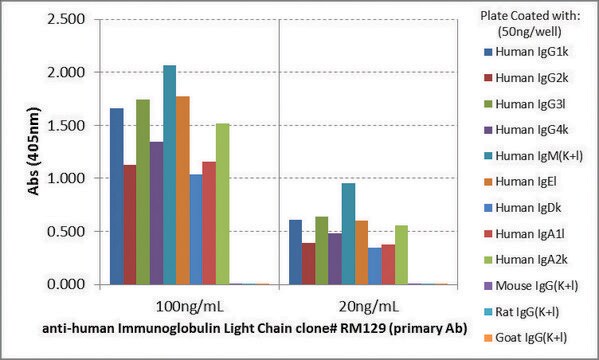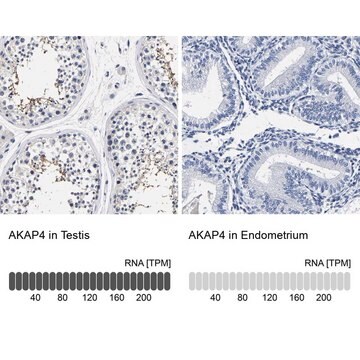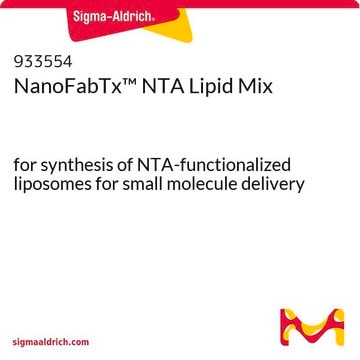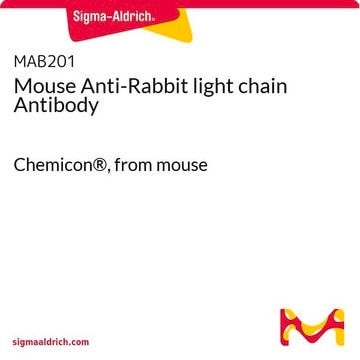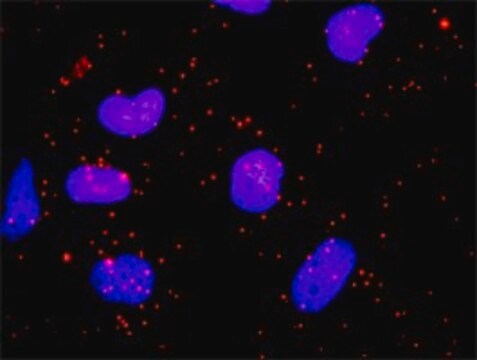AB9884
Anti-Clathrin Light Chain Antibody
serum, Chemicon®
Sign Into View Organizational & Contract Pricing
All Photos(1)
About This Item
UNSPSC Code:
12352203
eCl@ss:
32160702
NACRES:
NA.41
Recommended Products
biological source
rabbit
Quality Level
antibody form
serum
antibody product type
primary antibodies
clone
polyclonal
species reactivity
rat, human
manufacturer/tradename
Chemicon®
technique(s)
western blot: suitable
NCBI accession no.
shipped in
wet ice
target post-translational modification
unmodified
Gene Information
human ... CLTA(1211)
Specificity
Clathrin light chain a and b variants (CLC). By Western blot the antibody recognizes a doublet at ~35-40 kDa on rat brain extracts.
Application
This Anti-Clathrin Light Chain Antibody is validated for use in WB for the detection of Clathrin Light Chain.
Western blot: 1:50,000-1:100,000 on rat brain extracts.
Optimal working dilutions must be determined by end user.
Optimal working dilutions must be determined by end user.
Target description
~35-40 kDa
Legal Information
CHEMICON is a registered trademark of Merck KGaA, Darmstadt, Germany
Not finding the right product?
Try our Product Selector Tool.
Storage Class Code
10 - Combustible liquids
WGK
WGK 1
Flash Point(F)
Not applicable
Flash Point(C)
Not applicable
Certificates of Analysis (COA)
Search for Certificates of Analysis (COA) by entering the products Lot/Batch Number. Lot and Batch Numbers can be found on a product’s label following the words ‘Lot’ or ‘Batch’.
Already Own This Product?
Find documentation for the products that you have recently purchased in the Document Library.
Fan Fan et al.
Proceedings of the National Academy of Sciences of the United States of America, 118(32) (2021-08-08)
Pancreatic β cells operate with a high rate of membrane recycling for insulin secretion, yet endocytosis in these cells is not fully understood. We investigate this process in mature mouse β cells by genetically deleting dynamin GTPase, the membrane fission
Yang Yang et al.
Developmental cell, 43(4), 507-521 (2017-11-22)
Assembly of the endocytic machinery is a constitutively active process that is important for the organization of the plasma membrane, signal transduction, and membrane trafficking. Existing research has focused on the stochastic nature of endocytosis. Here, we report the emergence
Kazuki Obashi et al.
Nature communications, 14(1), 732-732 (2023-02-10)
Conformational changes in endocytic proteins are regulators of clathrin-mediated endocytosis. Three clathrin heavy chains associated with clathrin light chains (CLC) assemble into triskelia that link into a geometric lattice that curves to drive endocytosis. Structural changes in CLC have been
Stephanie A Zlatic et al.
Molecular biology of the cell, 24(15), 2378-2388 (2013-06-14)
A role for clathrin in AP-3-dependent vesicle biogenesis has been inferred from biochemical interactions and colocalization between this adaptor and clathrin. The functionality of these molecular associations, however, is controversial. We comprehensively explore the role of clathrin in AP-3-dependent vesicle
Mian Cao et al.
The Journal of neuroscience : the official journal of the Society for Neuroscience, 34(49), 16544-16549 (2014-12-05)
Several proteins encoded by PD genes are implicated in synaptic vesicle traffic. Endophilin, a key factor in the endocytosis of synaptic vesicles, was shown to bind to, and be ubiquitinated by, the PD-linked E3 ubiquitin ligase Parkin. Here we report
Our team of scientists has experience in all areas of research including Life Science, Material Science, Chemical Synthesis, Chromatography, Analytical and many others.
Contact Technical Service